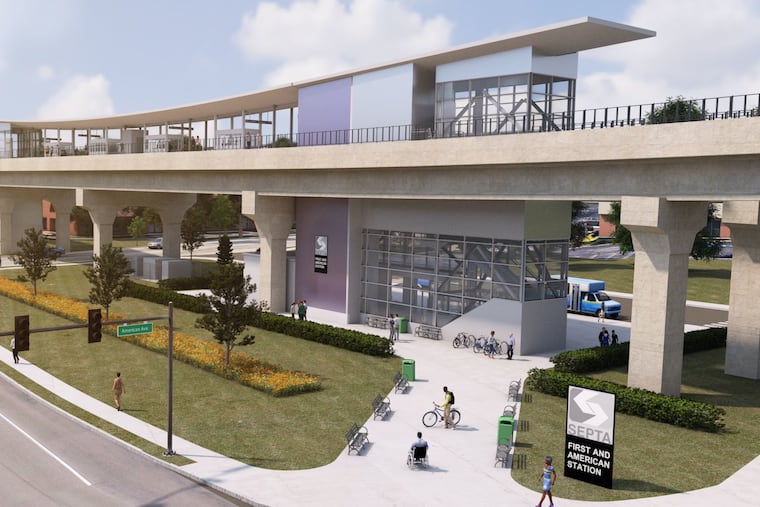SEPTA doubles down on commitment to $2B King of Prussia Rail project
SEPTA officials shared updates on the proposed extension on Tuesday, including changes to its route and renderings of its five stations.

Despite mounting financial uncertainty, SEPTA is doubling down its commitment to a $2 billion project that would extend rail service to bustling King of Prussia between 2025 and 2027.
SEPTA officials held a virtual public meeting Tuesday to give an update on the Norristown High Speed Line’s proposed extension into the area, sharing changes to its route as well as new renderings of its five stations to give the audience “a better idea for the look and the feel for what this will mean for them,” said Ryan Judge, SEPTA strategic planning manager.
The meeting was the first large-scale update on KoP Rail since 2017. Like its other ambitious plans, including trolley modernization, the extension would need additional sources of funding before becoming a reality, and how to pay for it was a puzzling question long before financial challenges brought on by the COVID-19 pandemic.
Officials shared the latest pricetag of the mammoth project during Tuesday’s webinar. The estimated cost has grown from $1.3 billion to $2 billion due to inflation as well as changes to design and real estate acquisition costs, said Liz Smith, SEPTA’s chief administration officer.
The project connecting King of Prussia, Center City, and University City will lean partially on federal dollars as it progresses, with officials wrapping up a final environmental impact statement by early next year to submit to the Federal Transit Administration.
SEPTA General Manager Leslie Richards called the KoP Rail project “extremely important” to the region’s future. Planning began in 2012, and it was once expected to carry riders in 2023.
“While we are in a very difficult position right now with the pandemic ... SEPTA in the future includes service to King of Prussia, “ she said. “It is part of our system that doesn’t exist now, and it’s a way that we can truly strengthen our Regional Rail.”
Early meetings to discuss the plan were met with pushback from neighbors who didn’t want a rail line so close to their homes. The line has moved away from residential areas in response to feedback, Judge said.
“We had well over 100 meetings, including almost two dozen backyard visits, where we worked really closely with the community to come up with an alignment that addressed a lot of their concerns,” he said. “What we did since then was to refine that a little bit more and tweak it to respond to some more of the comments that we heard at that point as well.”
The KoP Rail would stop at Henderson Road, Allendale Road, Mall Boulevard, First and American Avenues, as well as First Avenue and Moore Road/Valley Forge.
Its last stop “will have a 500-space parking garage strategically located to capture motorists traveling from US 422,” according to a video shown to attendees Tuesday of the line snaking from Hughes Park Station in Upper Merion to King of Prussia and Valley Forge.
» READ MORE: Businesses bullish for KoP rail as neighbors push for route change (from 2017)
The KoP Rail is expected to create up to 6,300 construction jobs, stimulate 5.3 million square feet of new development, and boost property values across the region, according to SEPTA. A trip from Center City to King of Prussia would take about 45 minutes, whereas a car ride along I-76 would take over an hour, the authority said.
Tuesday’s event comes as SEPTA faces a financial crisis to both its operating and capital budgets. The authority is struggling with fewer passengers during the COVID-19 pandemic to pay fares, while also eyeing long-term funding challenges that existed ahead of the virus.
“In terms of the funding, this is a longer-term project than the pandemic, so we’re looking beyond that,” said Jody Holton, SEPTA assistant general manager for planning. “It’s transformative for our economy and supporting the region as it grows.”
Ridership on SEPTA’s buses, trolleys, subways, and NHSL is down about 70% from pre-pandemic levels, while Regional Rail figures are down about 85%. Richards doesn’t believe ridership will return to pre-pandemic levels for years.
SEPTA, losing about $1 million a day, is considering service cuts, layoffs, and fare increases without additional financial support.
“We firmly believe in what transit provides and that the future includes transit and includes transit operating at full capacity to fully support our regional recovery after this pandemic,” Richards said. “For that to happen, King of Prussia Rail is part of that story.”
Additional information on the King of Prussia rail extension can be found online.